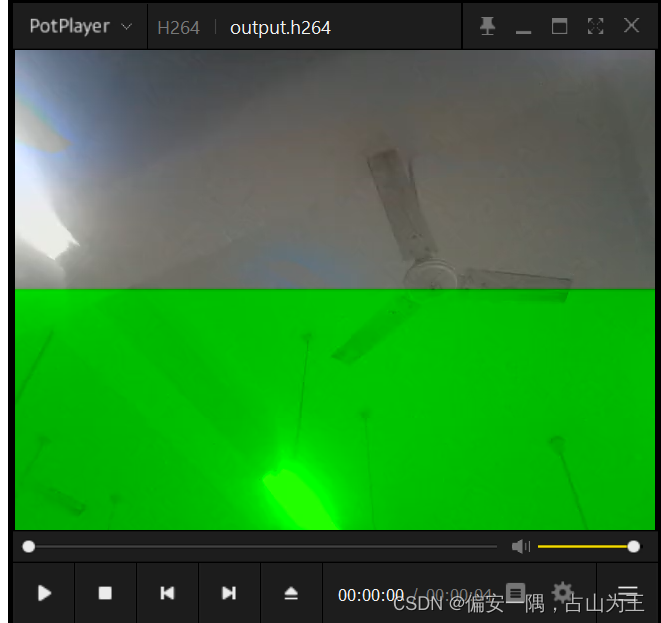Linux下FFmepg使用
1.命令行录一段wav,PCM数据
ffmpeg -f alsa -i hw:0,0 xxx.wav//录制
ffplay out.wav//播放
ffmpeg -f alsa -i hw:0,0 -ar 16000 -channels 1 -f s16le 1.pcm
ffplay -ar 16000 -channels 1 -f s16le 1.pcm-ar freq 设置音频采样率
-ac channels 设置通道 缺省为1
2.将pcm压缩为aac
ffmpeg -f s16le -ar 16000 -ac 1 -i s16_1_16000.pcm output.aac3.将aac转为pcm
ffmpeg -i out.aac -f s16le -ar 16000 -ac 1 -acodec pcm_s16le 16000_1_s16le.pcm
4.将aac通过网络传输
5.拉流网络数据
6.录一段原格式视频
7.录一段H264视频
ffmpeg -video_size 1280x720 -f x11grab -i "" -vcodec libx264 -preset ultrafast -f h264 -r 30 test.h264使用RTP发送H264,接收
ffmpeg -re -i d:\videos80P.264 -vcodec copy -f rtp rtp://127.0.0.1:1234
ffplay -protocol_whitelist "file,udp,rtp" -i rtp://127.0.0.1:1234//拉流并播放
注意:ffplay的RTP协议默认是不启用的,需要添加-protocol_whitelist参数把RTP协议加入白名单。但是,执行了上面的命令可能会出错,因为ffplay使用RTP协议接收需要一个SDP文件,该文件定义了输入流的格式信息以及接收端的IP和端口号。
我们可以让FFmpeg在执行推流输出时导出一个SDP,命令行如下:
ffmpeg -re -i d:\videos80P.264 -vcodec copy -f rtp rtp://127.0.0.1:1234>test_rtp_h264.sdp
(SDP文件的信息说明:传输协议:RTP/AVP,?接收端IP:127.0.0.1, ?接收端口号:1234 ,? PayloadType:96 ,视频格式:H264?)
以上面SDP文件为输入让ffplay打开流,命令行是:
ffplay -protocol_whitelist "file,udp,rtp" -i test_rtp_h264.sdp
8.用ffmpeg库录制一段音频数据
语音信号处理-基本概念(二):音频通道数、采样频率、采样位数、采样个数(样本数)、一帧音频的大小、每秒播放的音频字节大小、一帧的播放时长、音频重采样_语音录制采样率和采样率-CSDN博客
在Linux环境下使用ffmpeg将PCM音频数据编码成aac数据_linux ffmpeg pcm转acc-CSDN博客
9.重采样音频
两种重采样方法:
【FFmpeg实战】音频重采样_ffmpeg 音频采样率-CSDN博客
10.编码
11.传输
12 视频的采集编码(代码)
#include <stdio.h>
#include <stdlib.h>
#include <string.h>
#include <unistd.h>
#include <errno.h>
#include <stdio.h>
#include <string.h>
#include <error.h>
#include <iostream>
#define __STDC_CONSTANT_MACROS
extern "C"
{
#include "libavutil/avutil.h"
#include "libavdevice/avdevice.h"
#include "libavformat/avformat.h"
#include "libavcodec/avcodec.h"
#include "libswresample/swresample.h"
#include <libavutil/time.h>
#include <libswscale/swscale.h>
#include <libavutil/opt.h>
#include <libavutil/imgutils.h>
}
#define WIDTH 640
#define HEIGHT 480
#define FPS 30
#define BITRATE 1000000
//g++ video.cpp -I/usr/local/include -L/usr/local/lib -lavutil -lavdevice -lavformat -lavcodec -lavutil -lswresample -lswscale -o video
//yuyv422, 640x480, ffmpeg -h encoder=h264查看编码器支持的格式
int main()
{
AVFormatContext *fmt_ctx = NULL;
avdevice_register_all();
// 根据摄像头能力设置相关参数
AVDictionary *options = NULL;
av_dict_set(&options, "video_size", "640x480", 0);
av_dict_set(&options, "framerate", "30", 0);
// 打开视频设备
const AVInputFormat *input_fmt = av_find_input_format("video4linux2");
if (avformat_open_input(&fmt_ctx, "/dev/video0", input_fmt, &options) != 0) {
fprintf(stderr, "Cannot open video device\n");
return -1;
}
// 查找视频流信息
if (avformat_find_stream_info(fmt_ctx, NULL) < 0) {
fprintf(stderr, "Cannot find stream information\n");
return -1;
}
// 打印视频信息
av_dump_format(fmt_ctx, 0, "/dev/video0", 0);
// 打开输出文件
FILE *output_file = fopen("output.yuyv422", "wb");
if (!output_file) {
fprintf(stderr, "Error: Cannot open output file\n");
return 1;
}
FILE *output_file2 = fopen("output.h264", "wb");
if (!output_file2) {
fprintf(stderr, "Error: Cannot open output file\n");
return 1;
}
AVPacket packet;
AVFrame* frame;
frame = av_frame_alloc();
if (!frame) {
fprintf(stderr, "Failed to allocate frame\n");
return -1;
}
const AVCodec *codec = avcodec_find_encoder(AV_CODEC_ID_H264);//编码器参数也可以设置,用字典
AVDictionary *param = 0;
av_dict_set(¶m, "preset", "slow", 0);
av_dict_set(¶m, "tune", "zerolatency", 0);
if (!codec) {
fprintf(stderr, "Codec not found\n");
return -1;
}
AVCodecContext *codecContext = avcodec_alloc_context3(codec);
codecContext->width = 640;
codecContext->height = 480;
//codecContext->pix_fmt = AV_PIX_FMT_YUV422P;
codecContext->pix_fmt = AV_PIX_FMT_YUVJ420P;
codecContext->time_base = (AVRational){1, 30};
//码率:每秒传送的比特(bit)数单位为 bps(Bit Per Second),比特率越高,传送数据速度越快,bps,"b"表示数据量,"ps"表示每秒
codecContext->bit_rate = 400000;
codecContext->gop_size = 10;
codecContext->max_b_frames = 1;
//2.9 设置b帧最大值->设置不需要B帧
codecContext->max_b_frames = 0;
/codecContext->pix_fmt = AV_PIX_FMT_YUV420P; // The only pixel format that H.264 supports 未证实
if (avcodec_open2(codecContext, codec, ¶m) < 0) {
fprintf(stderr, "Could not open codec\n");
return -1;
}
// 7.为frame分配buffer
frame->format = codecContext->pix_fmt;//AV_PIX_FMT_YUYV422
frame->width = codecContext->width;
frame->height = codecContext->height;
int ret = av_frame_get_buffer(frame, 32);//0不需要对齐,32 字节对齐
if (ret < 0) {
fprintf(stderr, "Could not allocate the video frame data\n");
exit(1);
}
// 计算出每一帧的数据 像素格式 * 宽 * 高
// 1382400
int frame_bytes = av_image_get_buffer_size((AVPixelFormat)frame->format, frame->width,frame->height, 1);
//循环拷贝数据至frame
printf("frame_bytes %d\n", frame_bytes);
//将 YUYV422 数据填充到帧的 data[0] 中
//memcpy(frame->data[0], yuyv422Data, frame->width * frame->height * 2);//frame_bytes
struct SwsContext *sws_ctx = sws_getContext(WIDTH, HEIGHT, AV_PIX_FMT_YUYV422, WIDTH, HEIGHT, AV_PIX_FMT_YUV420P, 0, NULL, NULL, NULL);
AVFormatContext *fmt_ctx_in = avformat_alloc_context();
while (1)
{
if (av_read_frame(fmt_ctx, &packet) < 0) {
break;
}
fwrite(packet.data, 1, packet.size, output_file);
AVFrame *temp_frame = av_frame_alloc();
av_image_fill_arrays(temp_frame->data, temp_frame->linesize, packet.data, AV_PIX_FMT_YUYV422, WIDTH, HEIGHT, 1);
sws_scale(sws_ctx, (const uint8_t *const *)temp_frame->data, temp_frame->linesize, 0, HEIGHT, frame->data, frame->linesize);
av_frame_free(&temp_frame);
avcodec_send_frame(codecContext, frame);
avcodec_receive_packet(codecContext, &packet);
//av_write_frame(fmt_ctx, &packet); //写文件的packet
//printf("Init success\n");
// 写入输出文件
fwrite(packet.data, 1, packet.size, output_file2);
av_packet_unref(&packet);
}
return 0;
}
相关结构体:
AVFormatContext:FFMPEG结构体 - 简书 (jianshu.com)? 主要和流的一些信息相关,混合流和文件流
AVDictionary:设置流的参数信息,主要是采集时候
问题:视频常见问题(四):视频花屏和绿屏 - 知乎 (zhihu.com)
视频编码出来一半正常,一半绿屏

我的问题GPT给我解决了,产生问题到解决问题用来不到三分钟,GPT真香

本文来自互联网用户投稿,该文观点仅代表作者本人,不代表本站立场。本站仅提供信息存储空间服务,不拥有所有权,不承担相关法律责任。 如若内容造成侵权/违法违规/事实不符,请联系我的编程经验分享网邮箱:chenni525@qq.com进行投诉反馈,一经查实,立即删除!
- Python教程
- 深入理解 MySQL 中的 HAVING 关键字和聚合函数
- Qt之QChar编码(1)
- MyBatis入门基础篇
- 用Python脚本实现FFmpeg批量转换
- springboot/java/php/node/python蛋糕甜品在线销售系统【计算机毕设】
- flash(闪存)
- 用c语言写个电脑ip更改程序
- Spark安装笔记——备赛笔记——2024全国职业院校技能大赛“大数据应用开发”赛项——任务2:离线数据处理
- ORACLE错误码及解决方法
- Python第五章(列表)
- redis集群部署
- CSS基础方法——引入方式、属性、基础选择器
- 已解决 ValueError: Setting an array element with a sequence. 问题
- 【Proteus仿真】【Arduino单片机】电蒸锅温度控制系统